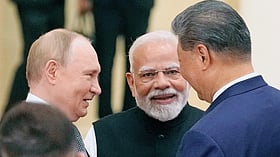India's dependency on China despite political tensions
International International NewsPosted by AI on 2025-09-07 08:55:06 | Last Updated by AI on 2025-09-07 12:02:27
Share: Facebook | Twitter | Whatsapp | Linkedin Visits: 0

Despite political tensions, India continues to rely on China for assistance with infrastructure developments, further deepening its dependency on its political rival.
China has been extending support to India in securing critical resources such as coal and semiconductors, essential to revamping its infrastructure and economic development. Most recently, Chinese companies have submitted expressions of interest (EoIs) to undertake the redevelopment of four airports in the Indian state of Maharashtra. While this partnership is framed as a positive step towards strengthening bilateral cooperation, there is a underlying fear that this has further entrenched India's dependency on its political rival.
The collaboration between the Mumbai Airport Authority and China's construction giant, China Communications Construction Company (CCCC), to develop the country's first airport city, is one of many instances where Chinese investment has been encouraged. Despite concerns over the lack of transparency and the overwhelming advantages to China, the Indian government has continued to welcome Chinese investment in infrastructure and other projects.
Chinese companies are reportedly frontrunners to secure the prestigious contracts for the airports' redevelopment, which could potentially be leveraged for spying or to establish Chinese intelligence networks in India. While the Mumbai airport development project exemplifies India's dependency on China, it is not the only sector where Chinese involvement is deepening.
Chinese companies also have a strong presence in India's telecommunications, power, and solar energy sectors. In 2022, India's Prime Minister Narendra Modi and Chinese President Xi Jinping pledged to strengthen ties across trade, investment, and infrastructure developments. While Modi urged cultural cooperation and connectivity, Xi emphasized the need to align development strategies.
These statements were made at the first India-China Summit on Investment Opportunities, a forum that highlighted the ability of Indian and Chinese companies to collaborate and develop infrastructure. Despite the political tensions between the two nations, it is clear that India continues to deepen its reliance on China, a fact that has unsettling implications for Indian citizens and politicians.
The longer-term implications of India's increasing dependency on China will determine whether this shows a strategic shift towards reconciliation or a practical acceptance of China's dominance.
Despite the political, cultural, and historical differences between the two Asian giants, India's growing ties with China show that in the face of political tensions, practical considerations can take precedence.
This shift towards accepting Chinese investment and support is a pragmatic approach, with India benefiting from access to talent and capital to boost its flailing infrastructure.
However, looking forward, there is an expectation that India will take a firmer stance on ensuring transparency and fairness in its dealings with China, especially regarding critical infrastructure developments, to avoid exacerbating the dependency.
Search
Categories
- Sports
- Business
- National
- Investments
- History
- Politics
- International
- Science & Technology
- Social Issues
- Disaster Management
- Current Affairs
- Events & Jobs
- మన పార్టీ
- మన నాయకత్వం
- మన విజయాలు
- డౌన్లోడ్స్
- మీడియా వనరులు
- కార్యకర్తలు
- రాజకీయం
- బిజినెస్
- సంపాదకీయం
- నవ్య
- చిత్ర జ్యోతి
- క్రీడలు
- జాతీయం
- తెలంగాణ
- తాజా వార్తలు
- Fast Check
- South
- Gallery
- Sunday Chronicle
- Hyderabad Chronicle
- Technology & Innovation
- Innovations and Initiatives
- బిజినెస్
- North East Skill Center News
- Government Schemes
- Entrepreneurship Support
- Employment Opportunities
- Skill Training Programs
- Education
- Startup Business
- Startup News
- Awards
- Community Services
- Fundraising Events
- Volunteer Services
- Health Initiatives
- సినిమా
- లైఫ్ స్టైల్
- క్రైం
- ట్రెండింగ్
- జాబ్స్
- అంతర్జాతీయo
- Market Buzz
- Banners
- Awards
- Partners
- Products
- Press Releases
- News
- Departments
- Initiatives
- Resources
- Telangana IT Parks
- Press Releases
- News
- Airport News
- Sports
- Business
- Newtons Laws of Motion
- Karbonn in Business
- Investments in Karbonn
- Company quarterly sales
- Markets
- Auto News
- Industry
- Money
- Advertisements
- Stock target
- Company Updates
- Stock Market
- Company Sales
- Staffing and HR
- Constituency Assembly
- General News
- Srikalahasti Temple
- Bojjala Sudhir Reddy
- Products
- Industries
- Services & Trainings
- Tools & Resources
- Technology Integration
- Drug Seizures & Arrests
- Telangana Narcotics
- Law & Enforcement
- Rehabilitation
- Nationwide Drug Policing
- Nigeria Seizures
- Global Operations
- Drug Awareness
- Drug Enforcement Tech
- NCB Drug Seizures
- Judicial Crackdown
- India's Surveillance Tools
- Cross-Border Links
- Women Safety
- Cyber Crimes
- Drug Abuse
- Traffic & Road Safety
- Community Connect
- Public Safety Alerts
- Citizen Assistance
- Nellore City News
- Politics & Administration
- Events & Festivals
- Agriculture & Rural
- Business & Economy
- Health & Wellness
Recent News
- Disturbing CCTV Footage Shows Police Assaulting Restaurant Employees In Kerala
- Baby sold for Rs 50,000, police rescue child with the help of Chief Minister
- RSS Supports Election Reforms, Flags State-Specific Challenges
- Contract Teachers Face Challenges with Job Security and Fair Pay
- The Counterintuitive Nature of Parrondo's Paradox Revealed
- Internet Disrupted in India, Pakistan, and Middle East: What We Know So Far
- Indian-made Telecom System Gets TEC Certification
- Suspected spinner Prenelan Subrayen cleared of flawed action by ICC